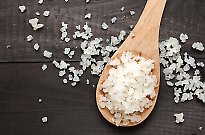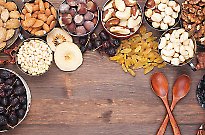
Exploring food energetics

Why eating close to nature is the way to go.
In traditional Chinese medicine, food is grouped into three categories: cooling, neutral and warming. NAT KRINGOUDIS unpacks the ways these groups interact with the body, and outlines the holistic benefits of eating closer to nature.
Food can do one of two things: it can benefit the body or it can be a deficit. Ancient civilisations understood these basic principles, but over time, we seem to have hit a grey area. We’ve disconnected from the fact that food will either take our health where we want it to go, or the contrary.
Along with vitamin D and sleep, food is a primal source of energy. We don’t drive our car into the petrol station and fill it up with water, and in the same way, we can’t expect our bodies to thrive with minimal or incorrect nourishment. But what’s more, depending on your health, the food you eat may be creating a perpetual state of poor health – especially if your gut health is compromised.
In traditional Chinese medicine, we drill down a little further to look at the energetic properties of food, finding that they fall into certain categories: warming, cooling and neutral. How these categories work in the body is pretty straightforward; the use of cooling foods is beneficial when there is excess heat in the body, such as sunstroke. By the same token, we use warming foods when there is internal cold, such as pain. The simplicity of this makes it very beautiful and easy for us all to adopt and drill down on the whole premise that food is indeed medicine. To explain this in more detail, let’s look at these categories individually.
COOLING FOODS
Cooling foods aid in clearing heat and toxins from the body, and nourishing the internals. For those of us who are always hot, perspire a lot, suffer from thirst, constipation, red eyes, cold sores, heartburn and thirst – to name the most common symptoms – using cooling foods can be useful in assisting your condition.
What to eat
Apples, pears, citrus fruits including grapefruits, strawberries, watermelon, celery, asparagus, cucumber, green vegies including spinach, lettuce, watercress as well as some unlikely vegies such as mushroom and tomato. Buckwheat and millet are considered cooling in nature also, as are eggs and yoghurt. Cooling teas such as chrysanthemum and peppermint are wonderful in helping to treat niggly ailments.
WARMING FOODS
Warming foods assist in raising energy of the body and the organs as they improve circulation. Symptoms may include cold extremities, aches and pains including upset digestion, bloating after eating cold foods, fluid retention and overall lack of energy and wellbeing.
What to eat
Red dates, cherries, apricots, mandarin peel, hawthorn fruit, coconut milk and flesh, onions, pumpkins, mustard, rice, certain nuts such as walnuts and chestnuts, as well as most meats and shellfish. Warming herbs such as chilli and cinnamon are beneficial, as are coffee and wine – in moderation, of course.
NEUTRAL FOODS
These foods are neither warming nor cooling, but help to maintain our overall wellbeing. They can be extremely beneficial when the digestive system is weak and needs strengthening, as they are often very easy to assimilate.
What to eat
Fruits and vegies such as berries, papaya, figs, carrots, sweet potato and potato, in addition to oats, rice, beans, fish, liquorice and honey being the most common.
SUPPORTING BALANCE
In traditional Chinese medicine, we see that the foods we consume on a daily basis support overall balance. It may be easy to see, based on the energetics of food, that this is the backbone of treatment in TCM. For example, if it’s hot, cool it down; if it is stuck, use methods to allow energy to flow more freely and if it’s deficient, gently support or nourish it.
It’s important to look at how your body feels after you’ve eaten certain foods to know if these ancient and effective ideas around food energetics are applicable. In my experience, the most common thing I see is bloating after the consumption of cold and raw foods. This is often a sign that the digestive system is struggling, so introducing more warming, cooked foods are of great benefit. Warming foods are easy to digest, which means we don’t get that bloated feeling.
When it comes to foods that are a deficit to the body, there are no guesses. If it hasn’t grown or roamed on the ground, then it’s best left on the shelf. Highly processed and refined foods do very little for your body and, in some instances, they can worsen your health as they take a lot of energy to break down with very little, if any, nutritional value. Consuming these foods can leave us further depleted and often unsatisfied, resulting in us eating more.
I encourage you to make good choices when it comes to the food you eat. There’s a smorgasbord of wholefoods on offer, all served up beautifully by nature. If we look to the properties of food in the most basic manner, it can indeed support our health on the next level.


